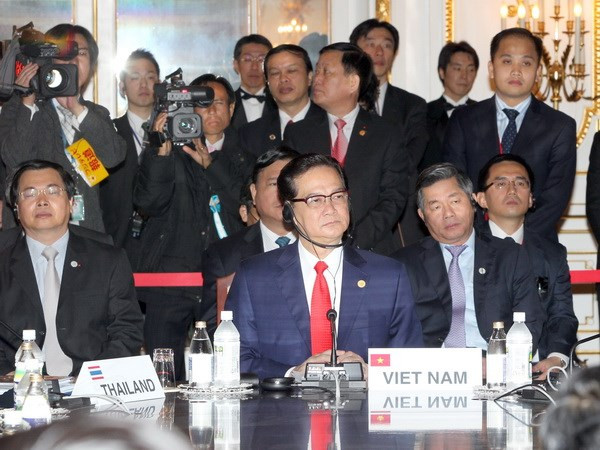Prime Minister highly appreciates ASEAN-Japan strategic relationship
On December 14, in Tokyo, Prime Minister Nguyen Tan Dung attended the Summit to celebrate the 40th anniversary of ASEAN-Japan Dialogue Relations.
At the conference, ASEAN and Japanese leaders shared positive assessments of the strong development and important achievements over the past 40 years in bilateral relations and cooperation in many fields, effectively contributing to peace, stability and prosperity in the region.
 |
| Prime Minister Nguyen Tan Dung attends the ASEAN-Japan Summit. Photo: VNA |
Japan was one of the first partner countries to establish dialogue relations with ASEAN in 1973 and joined the Treaty of Amity and Cooperation in Southeast Asia (TAC). In recent years, bilateral cooperation has been actively implemented through the Action Plans on ASEAN-Japan Strategic Partnership for the 2005-2010 and 2011-2015 periods.
Over the past 40 years, Japan has always been one of ASEAN's important economic, trade and investment partners, and the largest provider of aid and development cooperation. Currently, Japan is ASEAN's second largest trading partner with a total bilateral trade turnover of 262.4 billion USD in 2012. Japan's direct investment in ASEAN in 2012 reached more than 20 billion USD, accounting for 1/5 of the total foreign investment in ASEAN.
Cultural cooperation and people-to-people exchanges between the two sides have also achieved many positive results through cooperation and youth exchange programs, especially the ASEAN-Japan Youth and Student Exchange Program (JENESYS), which aims to connect people and enhance understanding of each other's traditional cultural and historical values for the people and young generations of both sides.
ASEAN leaders particularly appreciated Japan's active cooperation and important support for ASEAN in regional cooperation and connectivity, building the ASEAN Community, narrowing the development gap, as well as in responding to regional challenges.
Japanese Prime Minister Shinzo Abe affirmed his foreign policy based on five principles, emphasizing and attaching importance to strengthening relations and cooperation with ASEAN in all aspects, supporting ASEAN's central role in the regional structure. Japan will continue to support ASEAN in successfully building the Community, implementing regional connectivity, narrowing the development gap, promoting connectivity cooperation, developing sub-regions through the Mekong-Japan mechanism, and closely coordinating with ASEAN to make practical contributions to peace, stability and prosperity in the region.
The Japanese Prime Minister pledged to provide 2,000 billion yen for connectivity and gap-bridging projects in ASEAN over five years, extend and provide an additional 100 million USD for the ASEAN-Japan Connectivity Fund, provide 300 billion yen for cooperation and support to ASEAN in improving capacity in managing and responding to natural disasters, establish an Asian Center to enhance youth, student, artistic and academic exchanges with ASEAN, and organize an ASEAN Youth Football Tournament.
At the end of the conference, ASEAN and Japan leaders adopted the Vision Statement on ASEAN-Japan Friendship and Cooperation, the Plan for Implementation of the Vision Statement and the ASEAN-Japan Joint Statement on Cooperation in Addressing Regional and Global Issues, setting out major orientations and specific implementation measures to promote the ASEAN-Japan partnership for peace, security, stability and prosperity in the region.
According to the statement, ASEAN and Japan will strengthen cooperation in disaster management, counter-terrorism and transnational crime, maritime and aviation security and safety; enhance economic, trade and investment cooperation towards the goal of doubling bilateral trade and investment flows by 2022, narrowing the development gap, and cooperating in connectivity; soon complete and sign trade, services and investment agreements, moving towards the formation of a comprehensive ASEAN-Japan Free Trade Area; develop human resources, cultural, educational and tourism exchanges; address socio-economic and environmental issues and improve people's quality of life; respond to climate change, and manage and sustainably use water resources.
Regarding maritime security, the leaders also emphasized the importance and affirmed their determination to cooperate in ensuring maritime security and safety, freedom of navigation, unimpeded trade, and peaceful settlement of disputes in accordance with principles of international law, including the 1982 United Nations Convention on the Law of the Sea (UNCLOS); and supported official consultations between ASEAN and China on the Code of Conduct in the East Sea (COC).
Speaking at the conference, Prime Minister Nguyen Tan Dung highly appreciated the strategic importance of ASEAN-Japan relations and stressed the need to focus resources on implementing commitments, agreements and agreed cooperation programs; welcomed Japan's continued active and constructive contributions to peace, stability, cooperation and development in the region; prioritized support for ASEAN in building the Community, promoted regional connectivity and linkages, narrowed the development gap, developed the Mekong Sub-region and sustainably used water resources.
Discussing regional issues, Prime Minister Nguyen Tan Dung emphasized the need to ensure peace, security, safety and freedom of navigation, peacefully resolve disputes, comply with international law and the 1982 United Nations Convention on the Law of the Sea (UNCLOS), strictly implement the DOC Declaration and make efforts to soon reach a COC, ensuring freedom and safety of aviation on the basis of international law, practices and standards of the International Civil Aviation Organization (ICAO).
According to Vietnam+






